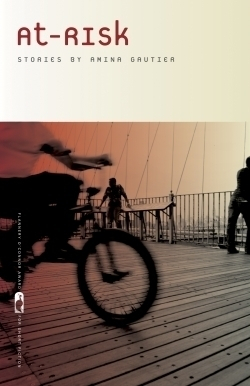
At-Risk
Winner of the 2010 Flannery O’Connor Award for Short Fiction, At-Risk confronts the problems of lower-income New Yorkers, from the anxieties of single mothers to the threat of drive-by shootings and early sexuality. Ten stories reveal sons and daughters who are mostly outsiders even in their own environments. With few exceptions, they lack a streetwise exterior, a fact which lends greater vulnerability to their stories. They include a boy genius; a book-loving girl who longs to become a librarian; brothers who eschew confrontation; a girl who is goaded by friends to shout at strangers; and a student attending an all-girl school, among others.
Gautier, whose stories have been anthologized in New Stories from the South and Best African American Fiction, avoids typecasting. The housing projects and surrounding neighborhoods are not the one-dimensional ganglands depicted in movies, and most families presented here exhibit kinship rather than disinterest or cycles of abuse. Drug addiction, abandonment by fathers, and similarly anticipated topics play meaningful yet smaller roles. Gautier instead explores more varied conflicts, including homophobic taunting in “Boogiemen” and a child’s shame over her mother’s actions in “Afternoon Tea.” Tensions exacerbated by these specific circumstances would still be plausible elsewhere; part of what makes At-Risk immensely appealing is the sense that Gautier has captured facets of youth which transcend borders.
The wisdom the author instills in her female characters is especially noteworthy. In “Push,” a girl asked to reflect upon her bullying realizes her victim would be invisible were it not for the attention received in being singled out. The conclusion that she is doing the girl a favor seems childish and self-justifying, yet chills with its potential accuracy. In “Dance For Me,” an adolescent testing her boundaries remarks, “I saw how much of me would change; I saw the girl I would become. And I decided to go ahead and miss myself right now, knowing that the girl I would become wouldn’t know how to appreciate me at all.” Moments of insight also appear in “Held,” a story featuring a teenaged mother who gradually accepts that childcare requires more than “maintenance.”
Lest this small handful of examples seem too close to epiphanies, readers should rest assured that Gautier handles denouements with sophistication. Despite its title, this is not a debut composed of rapid shocks and dangers, but a quieter accumulation of heartbreaking pressures. Another treasure in the University of Georgia Press’ acclaimed series.
Reviewed by
Karen Rigby
Disclosure: This article is not an endorsement, but a review. The publisher of this book provided free copies of the book to have their book reviewed by a professional reviewer. No fee was paid by the publisher for this review. Foreword Reviews only recommends books that we love. Foreword Magazine, Inc. is disclosing this in accordance with the Federal Trade Commission’s 16 CFR, Part 255.
